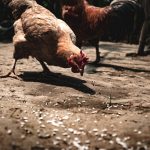Raccoons are highly intelligent and resourceful animals known for their dexterous paws and problem-solving abilities. They are primarily nocturnal, being most active at night. Omnivorous in nature, raccoons consume a wide variety of foods, including fruits, vegetables, insects, small animals, and even garbage.
Their excellent climbing skills allow them to easily scale fences and trees to access food sources. Raccoons are notably curious and will investigate any potential food source they encounter. These animals are capable of causing significant damage when attempting to access food.
They can tear through chicken wire, wood, and some types of metal. Raccoons are also known carriers of various diseases, including rabies, which poses a threat to both humans and other animals. Understanding raccoon behavior is essential for protecting chicken coops from these clever and determined creatures.
Raccoons demonstrate high adaptability, thriving in diverse environments from urban areas to rural settings. Their ability to locate food sources in human habitats often attracts them to chicken coops. By comprehending raccoon behavior, one can better prepare to protect chickens from these cunning predators.
Table of Contents
- 1 Securing the Chicken Coop
- 2 Installing Motion-Activated Lights or Alarms
- 3 Using Natural Deterrents
- 4 Removing Potential Food Sources
- 5 Regularly Inspecting and Maintaining the Chicken Coop
- 6 Seeking Professional Help if Necessary
- 7 FAQs
- 7.1 What are some effective ways to keep raccoons away from my chickens?
- 7.2 Why are raccoons a threat to chickens?
- 7.3 What are some signs that raccoons are targeting my chickens?
- 7.4 Are there any natural deterrents for keeping raccoons away from chickens?
- 7.5 Should I consider using traps or poison to control raccoons around my chickens?
Key Takeaways
- Raccoons are nocturnal and intelligent animals that are attracted to chicken coops for food and shelter.
- Securing the chicken coop with sturdy locks and barriers can help prevent raccoon intrusion.
- Installing motion-activated lights or alarms can startle raccoons and deter them from approaching the chicken coop.
- Natural deterrents such as predator urine or ammonia-soaked rags can help keep raccoons away from the chicken coop.
- Removing potential food sources such as fallen fruits or unsecured garbage can discourage raccoons from lingering near the chicken coop.
- Regularly inspecting and maintaining the chicken coop for any potential entry points or damage can help prevent raccoon intrusion.
- Seeking professional help from wildlife control experts may be necessary if raccoon infestation becomes a persistent problem.
Securing the Chicken Coop
Regular Inspections and Repairs
It’s also important to regularly inspect the coop for any signs of wear and tear and make repairs as needed. Another important aspect of securing the chicken coop is to make sure that there are no gaps or openings that raccoons can squeeze through. Raccoons are very agile and can fit through surprisingly small spaces, so it’s crucial to seal off any potential entry points.
Securing Openings and Vents
This may involve adding additional hardware cloth or wire mesh to windows, vents, and other openings. By doing so, you can prevent raccoons from finding a way into the coop.
Securing the Surrounding Area
In addition to securing the physical structure of the coop, it’s also important to secure the surrounding area. This may involve installing a predator-proof fence around the perimeter of the coop or using deterrents such as motion-activated sprinklers or lights to scare off raccoons. By taking these proactive measures, you can significantly reduce the risk of raccoon attacks on your chicken coop.
Installing Motion-Activated Lights or Alarms

Installing motion-activated lights or alarms can be an effective way to deter raccoons from approaching your chicken coop. Raccoons are nocturnal animals, so they are often most active during the night when they are more difficult to detect. By installing motion-activated lights around the perimeter of the coop, you can startle raccoons and make them think twice about approaching.
Motion-activated alarms can also be an effective deterrent for raccoons. These devices emit a loud noise when they detect motion, which can startle and scare off raccoons before they have a chance to cause any harm. Some motion-activated alarms are also equipped with flashing lights, which can further disorient and deter raccoons from approaching the coop.
In addition to deterring raccoons, motion-activated lights and alarms can also alert you to potential threats to your chickens. By installing these devices, you can be notified if there is any unusual activity around the coop, allowing you to take action before any harm is done. Overall, installing motion-activated lights or alarms can be an effective way to protect your chickens from raccoon attacks.
Using Natural Deterrents
Using natural deterrents can be an effective way to keep raccoons away from your chicken coop without causing them harm. There are several natural substances that raccoons find unpleasant or irritating, which can be used to create barriers around the coop. For example, sprinkling cayenne pepper or garlic powder around the perimeter of the coop can deter raccoons from approaching.
Another natural deterrent that can be effective against raccoons is predator urine. Many garden centers sell predator urine, such as coyote or fox urine, which can be used to create a scent barrier around the coop. Raccoons are naturally wary of predators, so the scent of predator urine can discourage them from approaching.
In addition to these natural deterrents, there are also plants that can help repel raccoons from your property. For example, planting marigolds or mint around the coop can help deter raccoons due to their strong scent. By using natural deterrents in and around your chicken coop, you can create a barrier that discourages raccoons from approaching without causing them harm.
Removing Potential Food Sources
Raccoons are attracted to chicken coops because they see them as a potential source of food. By removing potential food sources from your property, you can reduce the likelihood of raccoons being attracted to your chickens. This may involve securing garbage cans with tight-fitting lids, removing fallen fruits and vegetables from the ground, and keeping pet food indoors.
It’s also important to secure any compost piles or bins on your property, as these can attract raccoons looking for an easy meal. Compost piles should be covered with a tight-fitting lid or enclosed in a bin with a locking mechanism to prevent raccoons from accessing them. By removing potential food sources from your property, you can make your property less attractive to raccoons and reduce the risk of them targeting your chicken coop.
In addition to removing potential food sources, it’s also important to avoid feeding wildlife on your property. Feeding wildlife can attract raccoons and other animals looking for an easy meal, which can increase the likelihood of them targeting your chickens. By being mindful of potential food sources on your property and taking steps to remove them, you can reduce the risk of raccoon attacks on your chicken coop.
Regularly Inspecting and Maintaining the Chicken Coop

Sealing Off Entry Points
It’s important to inspect the coop for any gaps or openings that raccoons could use to gain access and seal them off promptly.
Maintaining a Secure Environment
In addition to inspecting the physical structure of the coop, it’s also important to keep the surrounding area clear of debris and potential hiding spots for raccoons. This may involve trimming back overgrown vegetation, removing brush piles, and keeping the area around the coop well-lit and free of clutter. By maintaining a clean and well-kept environment around the coop, you can reduce the likelihood of raccoons finding a place to hide and plan their attack.
Securing Food Sources
Regular maintenance also involves keeping food sources secure and inaccessible to raccoons. This may involve storing chicken feed in secure containers that raccoons cannot access and promptly cleaning up any spilled feed around the coop. By regularly inspecting and maintaining the chicken coop, you can create a secure environment for your flock and reduce the risk of raccoon attacks.
Seeking Professional Help if Necessary
If despite your best efforts, you find that raccoons continue to pose a threat to your chicken coop, it may be necessary to seek professional help. Wildlife control experts have the knowledge and experience to effectively deal with raccoon infestations and can provide solutions tailored to your specific situation. Professional wildlife control services may involve trapping and relocating raccoons away from your property or implementing more advanced deterrent methods that are beyond the scope of what you can do on your own.
These experts can also provide valuable advice on how to prevent future raccoon infestations and protect your chicken coop from further attacks. In some cases, it may also be necessary to consult with local authorities or wildlife agencies if you are dealing with a particularly persistent or aggressive raccoon problem. These agencies may have additional resources and expertise that can help address the issue effectively.
In conclusion, protecting your chicken coop from raccoon attacks requires a combination of understanding their behavior, securing the coop, using deterrents, removing potential food sources, regularly inspecting and maintaining the coop, and seeking professional help if necessary. By taking proactive measures and being diligent in protecting your flock, you can create a safe environment for your chickens and reduce the risk of raccoon attacks.
If you’re looking for ways to protect your chickens from predators, you may also be interested in learning about when guinea fowl lay eggs. Check out this article on poultrywizard.com to find out more about these unique birds and how they can help protect your flock.
FAQs
What are some effective ways to keep raccoons away from my chickens?
Some effective ways to keep raccoons away from your chickens include securing the chicken coop with strong locks, installing motion-activated lights or sprinklers, and using predator-proof fencing.
Why are raccoons a threat to chickens?
Raccoons are a threat to chickens because they are skilled predators and can easily break into chicken coops to prey on the birds. They are also known to carry diseases that can be harmful to chickens.
What are some signs that raccoons are targeting my chickens?
Some signs that raccoons are targeting your chickens include missing or injured birds, damage to the chicken coop or fencing, and evidence of raccoon tracks or droppings near the coop.
Are there any natural deterrents for keeping raccoons away from chickens?
Some natural deterrents for keeping raccoons away from chickens include using strong-smelling substances like ammonia or predator urine, as well as planting thorny bushes or using prickly mulch around the coop to discourage raccoons from approaching.
Should I consider using traps or poison to control raccoons around my chickens?
Using traps or poison to control raccoons around your chickens is not recommended, as it can be inhumane and may pose a risk to other wildlife, pets, or even humans. It is best to focus on preventative measures and non-lethal deterrents.
Meet Walter, the feathered-friend fanatic of Florida! Nestled in the sunshine state, Walter struts through life with his feathered companions, clucking his way to happiness. With a coop that’s fancier than a five-star hotel, he’s the Don Juan of the chicken world. When he’s not teaching his hens to do the cha-cha, you’ll find him in a heated debate with his prized rooster, Sir Clucks-a-Lot. Walter’s poultry passion is no yolk; he’s the sunny-side-up guy you never knew you needed in your flock of friends!







